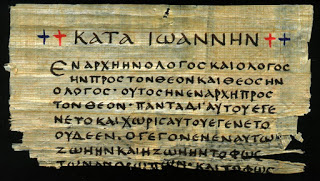Category theory and Koine Greek

When I was in college, I sat in on a communication workshop for Latin American preachers. This was unusual since I'm neither Latin American nor a preacher, but I'm glad I was there.
I learned several things in that workshop that I've used ever since. For example, when you're gesturing about something moving forward in time, move your hand from left to right from the audience's perspective. Since English speakers (and for the audience of this workshop, Spanish speakers) read from left to right, we think of time progressing from left to right. If you see someone talking about time moving forward, but you see motion from right to left, you feel a subtle cognitive dissonance. (Presumably you should reverse this when speaking to an audience whose primary language is Hebrew or Arabic.)
Another lesson from that workshop, the one I want to focus on here, is that you don't always need to convey how you arrived at an idea. Specifically, the leader of the workshop said that if you discover something interesting from reading the New Testament in Greek, you can usually present your point persuasively using the text in your audience's language without appealing to Greek. This isn't always possible-you may need to explore the meaning of a Greek word or two-but you can use Greek for your personal study without necessarily sharing it publicly. The point isn't to hide anything, only to consider your audience. In a room full of Greek scholars, bring out the Greek.
This story came up in a recent conversation with Brent Yorgey about category theory. You might discover something via category theory but then share it without discussing category theory. If your audience is well versed in category theory, then go ahead and bring out your categories. But otherwise your audience might be bored or intimidated, as many people would be listening to an argument based on the finer points of Koine Greek grammar. Microsoft's LINQ software, for example, was inspired by category theory principles, but you'd be hard pressed to find any reference to this because most programmers don't want to know or need to know where it came from. They just want to know how to use it.
Some things may sound profound when expressed in esoteric language, such as category theory or Koine Greek, that don't seem so profound in more down-to-earth language. Expressing yourself in a different language helps filter out pedantry from useful ideas. (On the other hand, some things that looked like pure pedantry have turned out to be very useful. Some hairs are worth splitting.)
Sometimes you have to introduce a new terms because there isn't a colloquial counterpart. Monads are a good example, a concept from category theory that has entered software development. A monad is what it is, and analogies to burritos and other foods don't really help. Better to introduce the term and say plainly what it is.
* * *
More on applied category theory